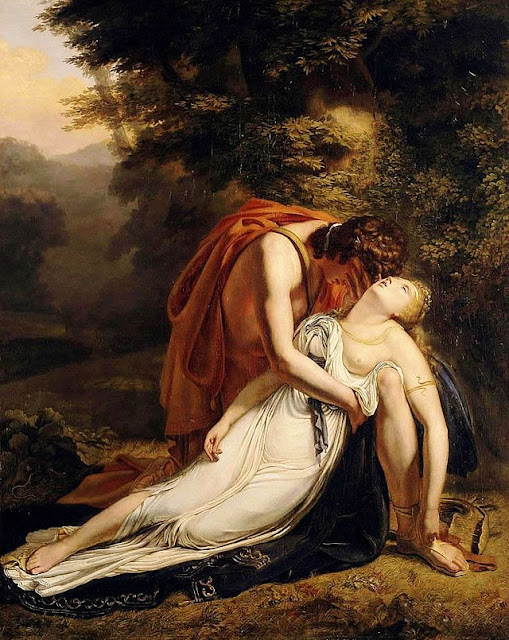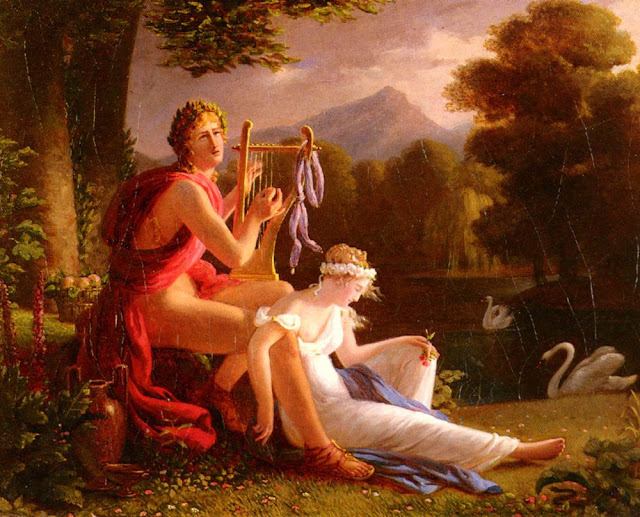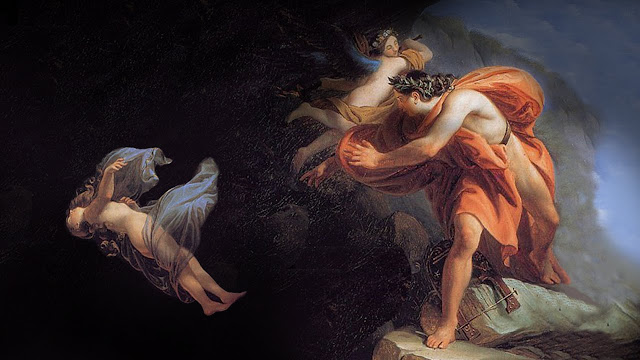ORPHEUS, son of the Thracian King Oeagrus and the Muse Calliope, was the most famous poet and musician who ever lived. Apollo presented him with a lyre, and the Muses taught him its use, so that he not only enchanted wild beasts, but made the trees and rocks move from their places to follow the sound of his music. At Zone in Thrace a number of ancient mountain oaks are still standing in the pattern of one of his dances, just as he left them. After a visit to Egypt, Orpheus joined the Argonauts, with whom he sailed to Colchis, his music helping them to overcome many difficulties-and, on his return, married Eurydice, whom some called Agriope, and settled among the savage Cicones of Thrace.
c. One day, near Tempe, in the valley of the river Peneius, Eurydice met Aristaeus, who tried to force her. She trod on a serpent as she fled, and died of its bite; but Orpheus boldly descended into Tartarus, hoping to fetch her back. He used the passage which opens at Aornum in Thesprotis and, on his arrival, not only charmed the ferryman Charon, the Dog Cerberus, and the three Judges of the Dead with his plaintive music, but temporarily suspended the tortures of the clanmeal; and so far soothed the savage heart of Hades that he won leave to restore Eurydice to the upper world. Hades made a single condition: that Orpheus might not look behind him until she was safely back under the light of the sun. Eurydice followed Orpheus up through the dark passage, guided by the sound of his lyre, and it was only when he reached the sunlight again that he turned to see whether she were still behind him, and so lost her for ever.
d. When Dionysus invaded Thrace, Orpheus neglected to honour him, but taught other sacred mysteries and preached the evil of sacrificial murder to the men of Thrace, who listened reverently. Every morning he would rise to greet the dawn on the summit of Mount Pangaeum, preaching that Helius, whom he named Apollo, was the greatest of all gods. In vexation, Dionysus set the Maenads upon him at Deium in Macedonia. First waiting until their husbands had entered Apollo’s temple, where Orpheus served as priest, they seized the weapons stacked outside, burst in, murdered their husbands, and tore Orpheus limb from limb. His head they threw into the river Hebrus, but it floated, still singing, down to the sea, and was carried to the island of Lesbos.
e. Tearfully, the Muses collected his limbs and buried them at Leibethra, at the foot of Mount Olympus, where the nightingales now sing sweeter than anywhere else in the world. The Maenads had attempted to cleanse themselves of Orpheus’s blood in the river Helicon; but the River-god dived under the ground and disappeared for the space of nearly four miles, emerging with a different name, the Baphyra. Thus he avoided becoming an accessory to the murder.
f. It is said that Orpheus had condemned the Maenads’ promiscuity and preached homosexual love; Aphrodite was therefore no less angered than Dionysus. Her fellow- Olympians, however, could not agree that his murder had been justified, and Dionysus saved the Maenads’ lives by turning them into oak-trees, which remained rooted to the ground. The Thracian men who had survived the massacre decided to tattoo their wives as a warning against the murder of priests; and the custom survives to this day.
g. As for Orpheus’s head: after being attacked by a jealous Lemnian serpent (which Apollo at once changed into a stone) it was laid to rest in a cave at Antissa, sacred to Dionysus. There it prophesied day and night until Apollo, finding that his oracles at Delphi, Gryneium, and Clarus were deserted, came and stood over the head, crying: ‘Cease from interference in my business; I have borne long enough with you and your singing!’ Thereupon the head fell silent. Orpheus’s lyre had likewise drifted to Lesbos and been laid up in a temple of Apollo, at whose intercession, and that of the Muses, the Lyre was placed in heaven as a Constellation.
h. Some give a wholly different account of how Orpheus died: they say that Zeus killed him with a thunderbolt for divulging divine secrets. He had, indeed, instituted the Mysteries of Apollo in Thrace; those of Hecate in Aegina; and those of Subterrene Demeter at Sparta.
1. Orpheus’s singing head recalls that of the decapitated Alder-god Bran which, according to the Mabinogion, sang sweetly on the rock at Harlech in North Wales; a fable, perhaps, of funeral pipes made from alder-bark. Thus the name Orpheus, if it stands for ophruoeis, ‘on the river bank’, may be a title of Bran’s Greek counterpart, Phoroneus, or Cronus, and refer to the alders ‘growing on the banks of’ the Peneius and other rivers. The name of Orpheus’s father, Oeagrus (‘of the wild sorb-apple’), points to the same cult, since the sorb-apple (French alisier) and the alder (Spanish-aliso) both bear the name of the pre-Hellenic River- goddess Halys, or Alys, or Elis, queen of the Elysian Islands, where Phoroneus, Cronus, and Orpheus went after death. Aornum is Avernus, an Italic variant of the Celtic Avalon (‘apple- tree island’).
2. Orpheus is said by Diodorus Siculus to have used the old thirteen-consonant alphabet; and the legend that he made the trees move and charmed wild beasts apparently refers to its sequence of seasonal trees and symbolic animals. As sacred king he was struck by a thunderbolt-that is, killed with a double-axe-in an oak grove at the summer solstice, and then dismembered by the Maenads of the bull cult, like Zagreus; or of the stag cult, like Actaeon; the Maenads, in fact, represented the Muses. In Classical Greece the practice of tattooing was confined to Thracians, and in a vase-painting of Orpheus’s murder a Maenad has a small stag tattooed on her forearm. This Orpheus did not come in conflict with the cult of Dionysus; he was Dionysus, and he played the rude alder-pipe, not the civilized lyre. Thus Proclus (Commentary on Plato’s Politics) writes: “Orpheus, because he was the principal in the Dionysian rites, is said to have suffered the same fate as the god”, and Apollodorus credits him with having invented the Mysteries of Dionysus.
3. The novel worship of the Sun as All-father seems to have been brought to the Northern Aegean by the fugitive priesthood of the monotheistic Akhenaton, in the fourteenth century BC, and grafted upon the local cults; hence Orpheus’s alleged visit to Egypt. Records of this faith are found in Sophocles (Fragments), where the sun is referred to as ‘the eldest flame, dear to the Thracian horsemen’, and as ‘the sire of the gods, and father of all things.’ It seems to have been forcefully resisted by the more conservative Thracians, and bloodily suppressed in some parts of the country. But later Orphic priests, who wore Egyptian costume, called the demi-god whose raw bull’s flesh they ate ‘Dionysus’, and reserved the name Apollo for the immortal Sun: distinguishing Dionysus, the god of the senses, from Apollo, the god of the intellect. This explains why the head of Orpheus was laid up in Dionysus’s sanctuary, but the lyre in Apollo’s. Head and lyre are both said to have drifted to Lesbos, which was the chief seat of lyric mimic; Terpander, the earliest historical musician, came from Antissa. The serpent’s attack on Orpheus’s head represents either the protest of an earlier oracular hero against Orpheus’s intrusion at Antissa, or that of Pythian Apollo which Philostratus recorded in more direct language.
4. Eurydice’s death by snake-bite and Orpheus’s subsequent failure to bring her back into the sunlight, figure only in late myth. They seem to be mistakenly deduced from pictures which show Orpheus’s welcome in Tartarus, where his music has charmed the Snake-goddess Hecate, or Agriope (‘savage face’), into giving special privileges to all ghosts initiated into the Orphic Mysteries, and from other pictures showing Dionysus, whose priest Orpheus was, descending to Tartarus in search of his mother Semele. Eurydice’s victims died of snake-bite, not herself.
5. The alder-month is the fourth of the sacral tree-sequence, and it precedes the willow- month, associated with the water magic of the goddess Helice (‘willow’); willows also gave their name to the river Helicon, which curves around Parnassus and is sacred to the Muse- the Triple Mountain-goddess of inspiration. Hence Orpheus was shown in a temple-painting at Delphi (Pausanias) leaning against a willow-tree and touching its branches. The Greek alder cult was suppressed in very early times, yet vestiges of it remain in Classical literature: alders enclose the death-island of the witch-goddess Circe (Homer: Odyssey)-she also had a willow-grove cemetery at Colchis (Apollonius Rhodius) and, according to Virgil, the sisters of Phaëthon were metamorphosed into an alder thicket.
6. This is not to suggest that Orpheus’s decapitation was never more than a metaphor applied to the lopped alder-bough. A sacred king necessarily suffered dismemberment, and the Thracians may well have had the same custom as the Iban Dayaks of modern Sarawak. When the men come home from a successful head-hunting expedition the Iban women use the trophy as a means of fertilizing the rice crop by invocation. The head is made to sing, mourn, and answer questions, and nursed tenderly in every lap until it finally consents to enter an oracular shrine, where it gives advice on all important occasions and, like the heads of Eurystheus, Bran, and Adam, repels invasions.



Comments
Post a Comment